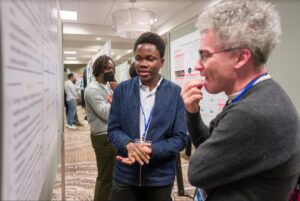Freshman Physics major Ronard Pabi received the 2022 Chance to Change Lives (CCL) Award for Outstanding STEM Research this Fall.
Chance to Change Lives is a non-profit organization with a vision of empowering future STEM leaders through innovative experiential learning. The Chance to Change Lives foundation is a non-profit organization based in Pittsburgh, PA, and was founded with a mission to support high impact experiential learning experiences for undergraduate students, especially from under-represented groups, to prepare them for twenty-first century research and development careers in Science, Technology, Engineering, and Mathematics (STEM) fields.

The Change to Change Lives provided travel funds for the Outstanding STEM Research award which is presented to a student who participated in the First Year Research Experience (FYRE) Program. The FYRE Program is dedicated to providing opportunities for students to engage in research experiences during the summer between their first and second years with a Gustavus faculty mentor in the Natural Sciences and Mathematics.
Under the supervision of Physics Professor Dr. Thomas Huber, Pabi’s research topic was Noise Reduction in Ultrasound Measurement Using Deep Learning. Deep learning is a type of machine learning and artificial intelligence that imitates the way humans gain certain types of knowledge. When sound waves are measured in a lab, there is a lot of noise in the measurements that prevents proper visualization of the waves. In his research, Pabi created and trained a computer model with the goal to identify these noises and get rid of them.
“I was drawn to this research mostly because of Deep Learning. I have seen how deep learning is transforming the world and technology around us. When the opportunity presented itself for me to engage in deep learning with Physics, I took it” stated Pabi.
He noted that the most rewarding part of his first research experience was being able to use deep learning to solve the problems that he and his team faced in their ultrasound measurements. Whereas, the most challenging aspect of the research was having to navigate which architectures in our deep learning model would provide the best results.
“Neither my research advisor nor I are deep learning experts so that was an exciting challenge we both had to face” reported Pabi.
Pabi presented his summer research at Gustavus’ annual Fall Symposium as well as at the National Society of Black Physicists annual conference in Virginia. He has big hopes to utilize his findings in the future.
“Because of this research experience, I’ve seen the potential that it has. I hope to use this research as a starting point to pursue other projects incorporating new technologies within Physics.” Pabi stated.
When reflecting on his first research experience, Pabi stated,
“Conducting research at Gustavus is the best place to start. You get the full research experience and the opportunity to work directly with your research professor.”